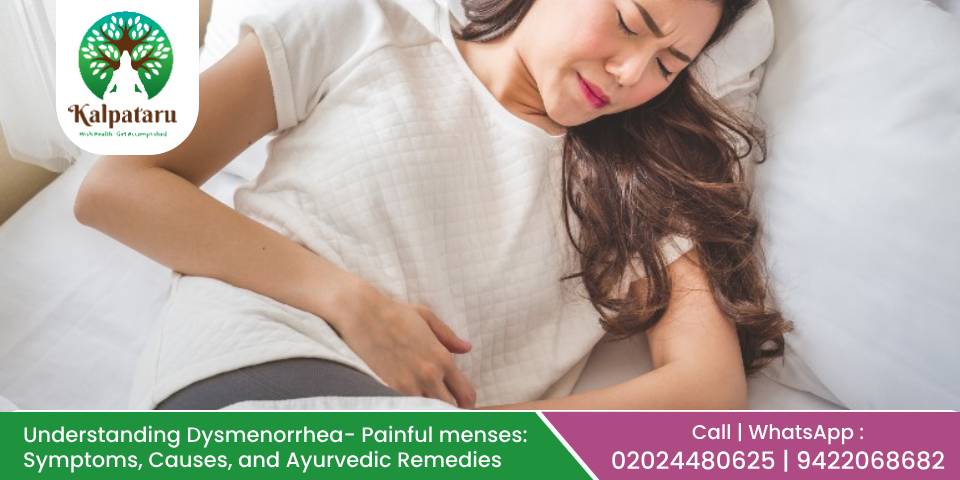Dysmenorrhea refers to the occurrence of painful menstrual cramps that occur immediately before or during menstruation. It is a common gynecological condition that affects a significant number of women worldwide, leading to discomfort and sometimes debilitating pain. The pain starts one or two days before the onset of the period and stops one or two days after the period begins
Dysmenorrhea is one of the most frequently reported menstrual disorders. Studies suggest that approximately 50-90% of menstruating women experience dysmenorrhea at some point in their lives. Among these, about 10-15% experience severe pain that interferes with daily activities. The prevalence is higher among adolescents and younger women, typically decreasing with age and often after childbirth.
Overview:
Dysmenorrhea is commonly observed in girls after they start their periods or before marriage. In many cases, the intensity of the symptoms decreases after marriage. However, if these complaints are frequent and severe, and do not improve with usual treatments, it is crucial to rule out other serious conditions like endometriosis or fibroids. Neglecting these issues can lead to complications, such as difficulties in conceiving after marriage.
Causes of Dysmenorrhea:
- Primary Dysmenorrhea: This type is caused by natural chemical changes in the body, specifically the overproduction of prostaglandins, which leads to increased uterine contractions.
- Secondary Dysmenorrhea: This type is due to underlying reproductive health issues such as endometriosis, fibroids, pelvic inflammatory disease, or other gynecological conditions.
Vitamin B1 Deficiency and Dysmenorrhea:
A deficiency in Vitamin B1, also known as Thiamine, can also cause dysmenorrhea. Thiamine plays a crucial role in energy metabolism and nerve function. Taking 100mg of Vitamin B1 for three months can provide significant relief from menstrual pain. Consuming unpolished rice, which contains Thiamine, can also help reduce painful menstrual cycles.
Symptoms of Dysmenorrhea:
- Lower abdominal pain
- Nausea
- Vomiting
- Dizziness
- Headaches
- Leg pain
Lifestyle Corrections:
Lifestyle correction plays a key role in managing dysmenorrhea. Proper nutrition, avoiding junk food and fast food, and following seasonal routines are essential. During periods, it is advisable to minimize heavy exercise and sports activities according to Ayurvedic recommendations.
For more information and treatment modalities watch our informative video
Ayurvedic Approaches to Managing Dysmenorrhea:
- Yoga and Meditation: Incorporating yoga and meditation into daily routines can help manage stress and improve overall well-being, thereby reducing the severity of menstrual pain.
- Exercise: Regular, moderate exercise helps improve blood circulation and can alleviate menstrual cramps.
- Panchakarma Treatments: Some Ayurvedic treatments, particularly Virechana (therapeutic purgation) and Basti (medicated enema), can be beneficial. For example, starting oil-based Basti treatment eight days before periods and continuing for three months can significantly reduce dysmenorrhea.
Dietary Recommendations:
Certain kitchen ingredients can also be helpful in managing dysmenorrhea. These include:
- Fennel Seeds: Known for their antispasmodic properties, fennel seeds can help relieve menstrual cramps.
- Fenugreek: Helps in balancing hormones and reducing menstrual pain.
- Asafoetida (Hing): Known for its anti-inflammatory properties, it helps in alleviating pain.
- Carom Seeds (Ajwain): Aid in digestion and relieve menstrual pain.
- Cumin Seeds: Help in reducing hormonal imbalances and alleviate pain associated with menstruation.
Conclusion:
Dysmenorrhea is a common condition that affects many women, but with the right approach, it can be managed effectively. By understanding the causes, recognizing the symptoms, and incorporating lifestyle changes along with Ayurvedic treatments, women can find relief from painful menstrual cycles. Proper nutrition, yoga, meditation, and the use of beneficial herbs and spices can play a significant role in alleviating the discomfort associated with dysmenorrhea. If symptoms persist or worsen, it is essential to seek medical advice to rule out any underlying conditions.
Dr. Manoj Deshpande and Dr. Aparna Deshpande at Kalpataru Ayurvediya Chikitsalaya™ Clinic provide the best Ayurvedic Treatment for Psoriasis & various diseases in Pune, Maharashtra. For more information about our comprehensive treatment options, or to requestan appointment with the best Ayurvedic Doctor in Pune, call +919422068682 / +919764837167 / 020-24480625 or Click on Book an Appointment.

